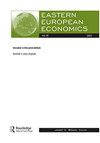左翼经济民粹主义与储蓄:态度如何影响前瞻性金融行为?
IF 1.2
4区 经济学
Q3 ECONOMICS
引用次数: 0
摘要
本文以乌克兰为例,探讨态度与储蓄行为之间的关系。我们假设,个人的偏好和信仰(我们用支持左翼民粹主义经济政策来代替)对战略和前瞻性行为产生不利影响。利用2019年进行的一项具有全国代表性的调查数据,我们发现支持民粹主义经济政策与银行储蓄的可能性呈负相关。在存在社会经济和行为因素的情况下,以及当我们从经济民粹主义的衡量标准中去除归因于文化和社会经济因素的差异时,结果成立。本文章由计算机程序翻译,如有差异,请以英文原文为准。
Left-wing Economic Populism and Savings: How Do Attitudes Influence Forward-Looking Financial Behavior?
ABSTRACT This paper uses the case of Ukraine to explore the association between attitudes and saving behavior. We hypothesize that individuals’ preferences and beliefs, which we proxy with support for left-wing populist economic policies, have an adverse effect on strategic, forward-looking behavior. Using the data from a nationally representative survey conducted in 2019, we find that support for populist economic policies has a negative association with a likelihood to have bank savings. The results hold in the presence of socio-economic and behavioral factors and when we remove the variation attributed to the cultural and socio-economic factors from our measure of economic populism.
求助全文
通过发布文献求助,成功后即可免费获取论文全文。
去求助
来源期刊

Eastern European Economics
ECONOMICS-
CiteScore
2.20
自引率
9.10%
发文量
32
期刊介绍:
Eastern European Economics publishes original research on the newly emerging economies of Central and Eastern Europe, with coverage of the ongoing processes of transition to market economics in different countries, their integration into the broader European and global economies, and the ramifications of the 2008-9 financial crisis. An introduction by the journal"s editor adds context and expert insights on the articles presented in each issue.
 求助内容:
求助内容: 应助结果提醒方式:
应助结果提醒方式:


